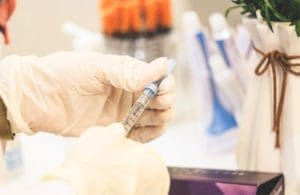
[Image by Sam Moqadam on Unsplash]
The NIH today announced that a clinical trial is underway to study whether people who are highly allergic or have a mast cell disorder are more likely to develop an allergic reaction to the Moderna or Pfizer-BioNTech COVID-19 vaccines.
Reports of severe allergic reactions to COVID-19 vaccines have made headlines since the rollout to the public began. Still, such anaphylactic reactions are rare, with only a few cases per million doses. To put things in perspective, tens of thousands of Americans end up in emergency rooms annually with severe allergic reactions.
Most of the rare, severe allergic reactions to the vaccines took place among people with a history of allergies — many of them with prior experience of having a life-threatening allergic reaction called anaphylaxis. Researchers are still uncertain why there are rare cases of anaphylactic reactions after the Moderna or Pfizer-BioNTech COVID-19 vaccines. Both do not contain common allergens such as eggs, latex, gelatin or preservatives.
The NIH’s National Institute of Allergy and Infectious Diseases is sponsoring and funding the news study, which is enrolling 3,400 adults ages 18 to 69 years at up to 35 academic allergy-research centers nationwide.
“The public understandably has been concerned about reports of rare, severe allergic reactions to the Moderna and Pfizer-BioNTech COVID-19 vaccines,” NIAID director Dr. Anthony S. Fauci said in a news release. “The information gathered during this trial will help doctors advise people who are highly allergic or have a mast cell disorder about the risks and benefits of receiving these two vaccines. However, for most people, the benefits of COVID-19 vaccination far outweigh the risks.”
About 60% of study participants must have either a history of severe allergic reactions or a mast cell disorder diagnosis; the other 40% will not. Two-thirds of those in the study will be women because severe allergic reactions to the COVID-19 vaccines (and vaccines in general) have occurred mainly among women.
The study participants will randomly receive either a Pfizer-BioNTech vaccine, a Moderna vaccine or a placebo — with neither the participants nor the investigators initially knowing what is being administered. The investigators — allergists trained to recognize and treat anaphylaxis who will have proper emergency medications and equipment on hand — will observe each participant for at least 90 minutes after injection.
The NIH expects to have study results by the late summer.